#ragtime e.l. doctorow
Explore tagged Tumblr posts
Note
i just saw a post of yours from a couple months ago… could you please talk more about your ragtime younger brother hard of hearing headcanon please please
YES!!!! Sorry for the delay—I’ve been on the road for the last few days. I have seen that post gaining more traction, though, and am very excited for any and all fans of this loser freak to talk to me.
Book spoilers and rambling under cut:
I started thinking about this headcanon before I finished the book. Turns out, in his last chapter where he spends a year in Mexico, he actually does canonically go deaf! So I guess this is more “what if he started to lose his hearing before/during the story?”
(I should also probably mention that I’m writing a fic right now about Younger Brother in which he is hard of hearing, so most of this will be about how I’m writing him in that.)
It’s implied in the musical, and shown very explicitly in the book, that Younger Brother’s work with explosives is very hands-on. Going out to blow stuff up in the factory testing grounds is kind of his first response when things go wrong for him. So it would totally make sense if he lost some hearing because of that. Though also as I’m writing this I’m imagining a very cruel alternate possibility where Father saw a hard of hearing person and went “hey! you’d be less of a liability than these other people in my explosives plant!” and only later found YB to be a natural with it.
So, he’s hard of hearing. What does he do now? I’ve researched what would have been available for him, and, it turns out, the turn of the century was a great time for hearing aids! With the carbon microphone coming onto the market, there was an explosion of patents designed to help the deaf and hard of hearing. There were massive models you’d keep at home on a table, tiny ones you’d hook over the top of your ear, and, my personal favorite, the portable Acousticon.
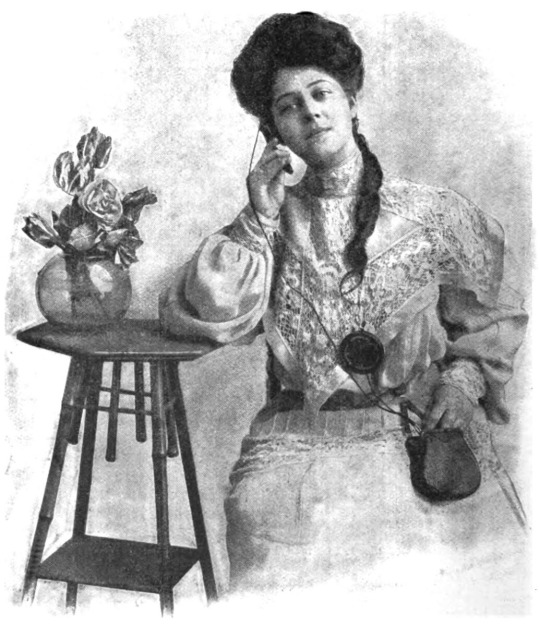
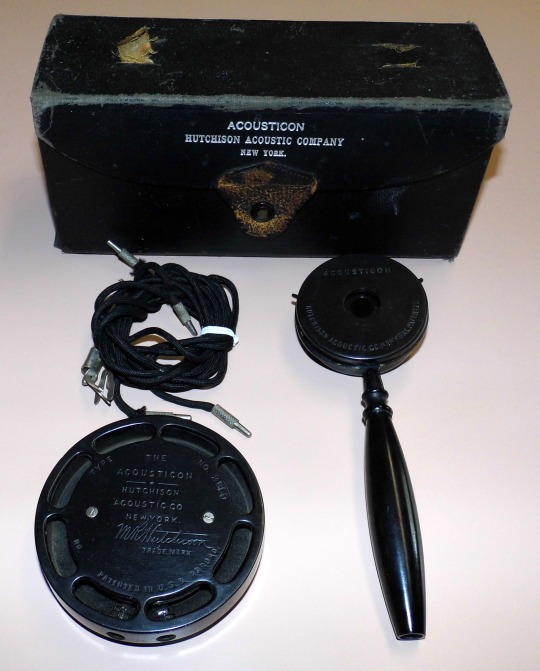
Most of the machinery was in the belt pack, which wired out to a microphone on the lapel and a reciever earpiece.
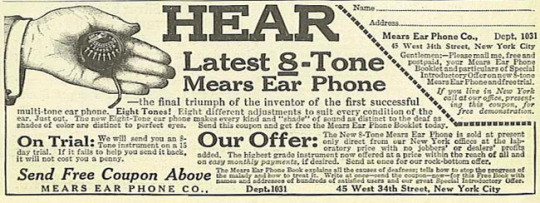
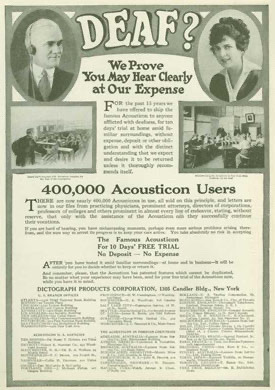
The ads are also fun, though these came a bit later.
There’s also a lot of possible symbolism. I am disabled, and I know that disability as symbolic is really easy to do wrong, but I think it 100% can work. This is a great example. Younger Brother already has speaking/hearing symbolism in canon, so making his hearing something which he’s more aware of adds some fun depth to that.
Part of it is people’s voices, and why he can or can’t hear them. Mother speaks with almost desperately perfect diction, representing the easy-to-digest life in New Rochelle. It also shows that they have a positive relationship, that she can be politely and subtly accommodating. Father, on the other hand, is only really understandable because of the sheer volume of his voice. It’s not really a great solution, but I guarantee that if you told him you couldn’t understand him he’d just try and talk even louder.
Sarah, though, would probably speak in a whispery mumble from her voice being disused. At least at first. She opens up at the same time that she becomes friends with Younger Brother (another minor plot point from the book that I cherish deeply). And, besides, a lot of her actions speak more loudly than words.
He knows what’s happening in this moment and doesn’t need to hear Sarah to help her. Even if he hasn’t yet come to understand the oppression she faces, this is a moment of basic human empathy.
(I also like that clip because, instead of having Grandfather escort Sarah away like the script says, Younger Brother does at first. I know it’s probably just the audience, but I SWEAR I can hear him telling her “it’s okay”.)
I’m kind of rambling, but my point is that I really like the idea of using him to tell a literal story about learning to be comfortable with a disability and receiving accommodations for it, but which also parallels his canon arc of becoming more aware of the struggles people around him face.
And this is because of intersectionality! Younger Brother, even from the start of the story, feels like a bit of an outsider in New Rochelle. He can play the part, but he doesn’t seem to get the inherent respect other men in the community do. So he tries to find belonging with Coalhouse. He finds camaraderie, but not community. He, as a white person, can never really understand the lives of these Black people. His disability is invisible until he pulls out a symbol of his wealth and privilege to accommodate it. But he can still come to realize that the oppressed can be allies to one another.
I hope any of this made sense, I feel like I’m not articulating my points very well haha. But thank you for giving me a chance to talk about my favorite freak!
#cormorant’s chatter#ragtime broadway#ragtime musical#ragtime 1996#ragtime movie#ragtime film#ragtime 1981#ragtime book#ragtime novel#ragtime e.l. doctorow#ragtime 1975#younger brother ragtime#mother’s younger brother ragtime
5 notes
·
View notes
Text
Aborted book reviews: reviews of books that I gave up reading after less than 100 pages
The Worst Hard Time by Timothy Egan. If you have seen Ken Burns’ dustbowl documentary, then I feel like you’ve gotten most of what is in this book. It was fine but after about 50 to 60 pages I realize that I didn’t actually care that much about the dust bowl. There’s only so much you can learn about a handful of broken nobodies who moved to a doomed area hoping for a better life that would never happen. Like I know what happens to most of them, they get screwed by the greed of farmers in the dust bowl and they end up with lives that are either cut short or marked by tragedy. 
Ragtime by E.L.Doctorow. I read this in college and I remember liking it. It was a really big deal in 1975 when it was published because it introduced real characters into the lives of his fictional cast of characters. So like Harry Houdini visits the home of the fictional characters in his book and I guess that’s interesting but I guess I just wasn’t really grabbed initially because in the first 30 pages you get introduced to like at least 15 or 20 characters, and I just didn’t learn enough about any of their struggles to really want to find out what happens to them. Eventually, I just realized that I would rather read something else. Also, the fact that mother’s younger brother is always referred to as mother’s younger brother, and not by their name is one of those authorial choices that gets a little bit tedious/cheesy after a while. 
3 notes
·
View notes
Text

#49
1 note
·
View note
Text
" Friendship is what endures. Shared ideals, respect for the whole character of a human being. "
- E.L. Doctorow, Ragtime
3 notes
·
View notes
Note
Damn, almost missed this somehow lol (sorry, the numbers don't copy 😔)
OC you most struggled to make?
How many projects do you have going on right now? Are there any that you doubt you’ll ever finish?
What are all the “kinds” of writing/art you do? (short stories, poetry, screenplays, digital, painting, clay, etc.)
What are your favourite books?
Thanks for the asks, Anna! From this ask game.
OC you most struggled to make?
Probably one of the ones that appeared in one of the WIPs I've since scrapped (which explains why I scrapped them). My characters talk to me, and sadly, sometimes they say "Yeah, I don't wanna be in this book." 😂
Before I decided to continue with my current WIP, I had plans for a contemporary romance focused on royalty (and non-royalty) from a fictional country. I loved the male MC, but the female MC was just resisting me at every turn. I couldn't get a clear picture of her face, her background, her motivation, anything. So into the bin she went.
I also had another YA historical romance going for a while that I put on the back burner because the male MC wasn't working for some of the same reasons, although I'm still in love with the concept (it was Oliver Twist-inspired!).
How many projects do you have going on right now? Are there any that you doubt you’ll ever finish?
If you count "projects that exist in my brain," the number is probably infinite. I've had things I've wanted to write for 10 years or more( see above) but haven't for various reasons. In terms of official WIPs, I'd say 3, but only one is really active at the moment.
What are all the “kinds” of writing/art you do? (short stories, poetry, screenplays, digital, painting, clay, etc.)
At different points in my life, I've written short stories, poetry, flash fiction, screenplays, stage plays, and even songs. I thought learning as many forms of writing as I could would make me well-rounded (it really just made me exhausted). And that doesn't even take into account the nonfiction writing I do. At the moment, though, I'm more or less only working in long-form fiction (i.e. novels).
What are your favourite books?
Thank god the question was "books," plural! Here's a selection off the top of my head:
The Blind Assassin - Margaret Atwood
Les Miserables - Victor Hugo
The Magus - John Fowles
Dreamland - Kevin Baker
Ragtime - E.L. Doctorow (also Loon Lake by same)
Bel Canto - Ann Patchett
Labyrinths - Jorge Luis Borges
The Egyptologist - Arthur Phillips
The True Confessions of Charlotte Doyle - Avi
The Westing Game - Ellen Raskin
Troubling a Star - Madeleine L'Engle
The Secret Garden and A Little Princess - F.H. Burnett
The Chronicles of Narnia (favorite being The Magician's Nephew) - C.S. Lewis
This list should not be considered exhaustive 😂
6 notes
·
View notes
Text
And though the newspapers called the shooting the Crime of the Century, Goldman knew it was only 1906 and there were ninety-four years to go.
-Ragtime, E.L. Doctorow
0 notes
Text
Poor Father, I see his final exploration. He arrives at the new place, his hair risen in astonishment, his mouth and eyes dumb. His toe scuffs a soft storm of sand, he kneels and his arms spread in pantomimic celebration, the immigrant, as in every moment of his life, arriving eternally on the shore of his Self.
from Ragtime: a Novel, by E.L. Doctorow
0 notes
Photo
There was an E.L. Doctorow book where the protagonist traveled quite far in that east coast area just on streetcars. Ragtime, i think.

The 644 000 Public Transport Stops of France
761 notes
·
View notes
Text
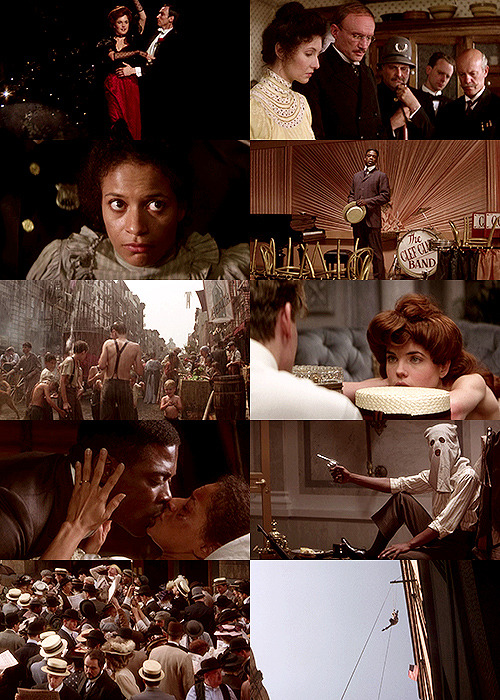
Ragtime (1981). A young black pianist becomes embroiled in the lives of an upper-class white family set among the racial tensions, infidelity, violence and other nostalgic events in early 1900s New York City.
It's impossible to argue with the fact that Miloš Forman knew how to make good cinema, but more than that, he really knew how society and culture informed a character's interior life, from their personal conflicts to their relationships to how they navigated the world around them. We saw it in One Flew Over the Cuckoo's Nest and Hair, but I think nevermoreso than here, which feels ahead of its time in its nuanced approach to white privilege and the social structures that silence people. Plus the cast is absolutely stacked, I can't believe I didn't know more about this going in. 8/10.
#ragtime#1981#Oscars 54#Nom: Supporting Actor#Nom: Supporting Actress#Nom: Adapted Screenplay#Nom: Score#Nom: Song#Nom: Costume#Nom: Art Direction#Nom: Cinematography#milos forman#e.l. doctorow#michael weller#heinrich von kleist#james cagney#elizabeth mcgovern#Howard E. Rollins Jr.#brad dourif#moses gunn#mandy patinkin#mary steenburgen#debbie allen#1900s#america#american#class#race#8/10
28 notes
·
View notes
Text
Ragtime (Milos Forman, 1981)
La aportación más sorprendente y admirable al acierto de Ragtime es, sin duda alguna, la de Forman. Puede que no se trate de un film «de autor», sino «de productor», pero la labor del director es ejemplar en su modestia, y alcanza una sutileza, una profundidad y una perfección a las que ni en los tiempos felices de Pedro el negro y Los amores de una rubia se había aproximado. Porque no es sólo que haya sabido ordenar el embotellamiento de tráfico en el interior de una factoría que supone el rodaje de una superproducción ambientada en el pasado, ni que se las haya apañado para hacer con claridad, gracia y fluidez las transiciones de una historia a otra, de un escenario al siguiente y de unos personajes a sus opuestos sin perder el equilibrio, gracias al ágil y continuo «relevo» de tramas narrativas, siempre en vigor, hasta cuando quedan momentáneamente «suspendidas» y son suplantadas por sus complementarias.
Ni hay que insistir en que decorados, vestuario, fotografía (Miroslav Ondricek), música (Randy Newman) y los restantes componentes son impecables y útiles, sin atraer hacia sí mismos la atención del espectador, es decir, que están admirablemente integrados y coordinados por el director. Lo que me maravilla de verdad es la habilidad de Forman como retratista, pues no se conforma con escoger los rostros más adecuados —aunque no sean taquilleros— y dirigir a todos los intérpretes magistralmente (James Olson, Mary Steenburgen, Brad Dourif, Elizabeth McGovern, Howard E. Rollins, James Cagney, Norman Mailer, Robert Joy, Mandy Patinkin, y hasta los espectros de Pat O'Brien y Donald O'Connor están perfectos), sino que consigue descubrirnos nuevas facetas, rasgos adicionales, caras ocultas de los personajes en el curso de la película, es decir, que permite que vayamos conociéndoles poco a poco y que nos demos cuenta de que a menudo la primera impresión que tuvimos de ellos era equivocada, apresurada, convencional, incompleta o simplista. Así, por ejemplo, Evelyn Nesbit (E. McGovern) parece la tonta que le hacen ser hasta que la vemos un momento a solas, en libertad, sin posar ni tener que representar un papel —en la bulliciosa calle de emigrantes, cuando conoce a Tateh (M. Patinkin) y su niña—, para luego ser otra vez anulada como persona; del mismo modo, la Madre (Mary Steenburgen, la inolvidable heroína de Los pasajeros del tiempo, se nos puede antojar demasiado rígida en sus funciones de ama de casa acomodada y puritana cuando la vemos de perfil, pero se revela tal como en el fondo es aun antes de que la historia nos lo confirme, en cuanto Forman la encuadra de frente, mirándola a los ojos; esto sucede también con esos motores de la acción que son el Hermano Meno (B. Dourif, el de Sangre sabia) y Coalhouse Walker, Jr. (H. E. Rollins), y, sobre todo, con el que, sin que uno lo advierta mientras ocurre, más hace y más cambia, más se revela y mejor llegamos a conocer, el Padre (James Olson, prodigioso), probablemente el más patético y modesto de todos, el menos llamativo y pintoresco y el que, en el recuerdo, acaba por resultar, pese a lo antipático y pesado que parece al principio, el menos habitual y el más apreciable: la pausada discreción con que el paso del tiempo va desvelando su secreto a partir del poso que deja en nuestra memoria insinúa el método —si puede calificarse así— empleado por Forman en toda la película.
Sólo por haber creado este personaje —con una densidad, una riqueza y una presencia que no deben nada al libro—, Forman merece admiración, porque pocos cineastas actuales son capaces todavía de infundir cinematográficamente tanta vida, tal cantidad de biografía no narrada. Pero no es sólo eso: en Ragtime hay mucho más, sin que sobre nada; si acaso, hubiese deseado que durase un par de horas más, para que pudiese contarnos entera y a su ritmo la historia del emigrante eslavo que acabó convertido en director de cine pionero y de su hijita rubia.
• • •
El ragtime es un estilo de tocar el piano en el que la mano izquierda, muy móvil, confiere una tonalidad grave a los tiempos fuertes y otra más aguda a los débiles, mientras la derecha se ocupa de exponer sincopadamente la melodía y diversos adornos. En general, se interpretaban varios temas encadenados por interludios de dos o cuatro medidas. Al principio, solían ser piezas escritas, que se tocaban sin improvisaciones, aunque luego se utilizaron como base a partir de las que ejecutar variaciones. Como advierte E. L. Doctorow en la cabecera de su novela, citando a Scott Joplin nada menos, «nunca es bueno tocar el ragtime rápidamente...».
• • •
Ragtime (1974-75) es la cuarta novela de Doctorow, nacido en New York City en 1931 (un año antes que Forman en Praga), y tuvo un gran éxito de ventas. La primera, Welcome to hard times (1960), es un western digno de tan hermoso título, y fue llevada al cine en 1967 por Burt Kennedy, también sin repercusión alguna; de la segunda no se suele mencionar ni el nombre, Big as life; la tercera gustó mucho a la crítica y a ciertos lectores expertos, escritores sobre todo. Trataba sobre los Rosenberg, y se llamaba The book of Daniel (1971); Doctorow vivió de becas mientras escribía Ragtime, y sus numerosas reediciones no le convirtieron en un fabricante de best-sellers tipo Hailey, Michener, Forsyth o Lapierre & Collins: en 1979 estrena un drama, Drinks before dinner, y en 1980 publica, de nuevo con éxito, pero sin apartarse de sus preocupaciones en lo más mínimo, su quinta novela, Loon lake.
• • •
Cuento esto porque casi todo lo que he leído acerca de la película revela un desconocimiento y una falta de interés por uno de sus «autores» que me resulta incomprensible, ya que, sin temor a exagerar, y en cuanto mero lector, no me es fácil pensar en otros cinco escritores norteamericanos surgidos en los 60 y 70 más apasionantes y prometedores que Doctorow, y a él se deben, sin duda, buena parte de los valores de la película dirigida por Forman. Es curioso, por otra parte, que la novela se recuerde como algo enorme e inasible, ya que ni su estructura —aunque fragmentaria— es complicada ni su volumen es desmedido (unas doscientas veinte páginas de edición de bolsillo corriente). Prueba de ello es que cuando al productor italiano trasplantado a Hollywood Dino de Laurentiis se le metió en la cabeza convertirla en película, todo el mundo le tomó por loco y se dio por imposible la adaptación. Con buen ojo, De Laurentiis pensó que Robert Altman —que acababa de rodar Thieves like us, California split, aún inéditas, y Nashville— podría dirigirla, aunque después se pelearan y el proyecto quedase en el aire hasta que, por fin, con un cambio de enfoque que estoy lejos de lamentar, De Laurentiis optó por el refugiado checo Milos Forman.
De modo que De Laurentiis —suyo es el proyecto y el empeño, suyo el dinero y el riesgo, suyo el mérito de haber puesto a disposición del director el equipo técnico y artístico, y los cuantiosos medios funcionalmente empleados— es un segundo responsable del éxito artístico de esta película.
• • •
Algo menos valiosa parece en cambio la contribución del para mí desconocido guionista Michael Weller, pues su trabajo se ha limitado a simplificar la novela por supresión de personajes (Houdini, Emma Goldman, Henry Ford, J. Pierpont Morgan) y de numerosos episodios de las historias de otros (en particular de Tateh y del Hermano Menor), con el resultado de que la delirante tragedia a lo Von Kleist (Michael Kohlhaas), de Coalhouse, Walker, Jr., en lugar de interrumpir e interferir las restantes se convierta en eje principal de la película, por lo que ésta concluye forzosamente en anticlímax.
Afortunadamente, lo que Forman no ha sido nunca es un «ilustrador de guiones»: la trama, por ingeniosa o compleja que pueda ser, es un armazón a partir del cual desarrolla su trabajo de director cinematográfico, que para él, como para muchos grandes cineastas americanos —nacidos o no en Estados Unidos—, se acerca más, sin duda, al de un intérprete que al de un compositor. Y hay que decir, para terminar ya, que Forman toca bien con la mano izquierda siempre, pero que con la derecha es un maestro del ragtime.
Miguel Marías
Publicado en el nº 17 de Casablanca (mayo de 1982)
1 note
·
View note
Photo

#poetry#poets on tumblr#writerscreed#poetryriot#twcpoetry#blotchedpoems#abstractcommunity#creative writing#espionage#weather control#e.l. doctorow#ragtime#Titus the Android#Stormy Songs
12 notes
·
View notes
Text
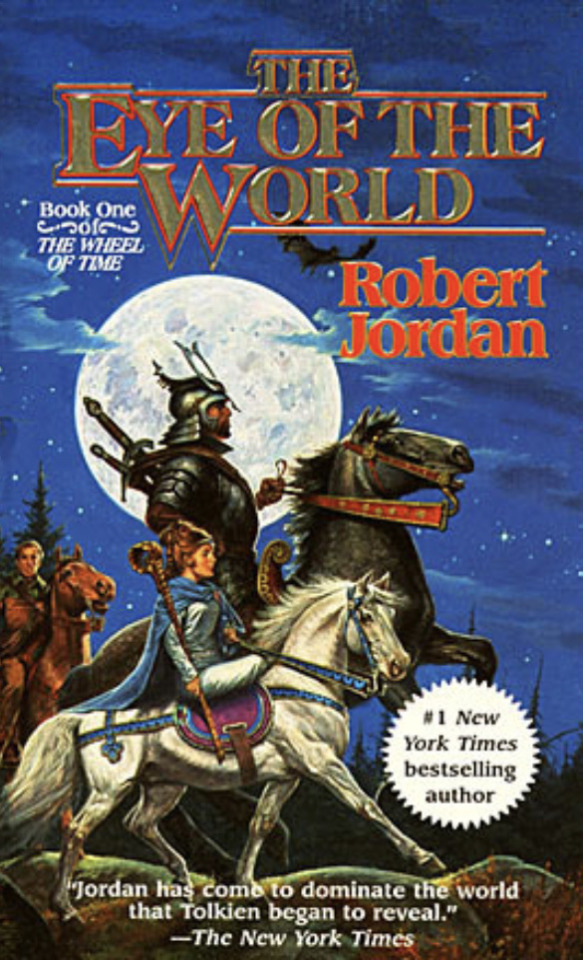
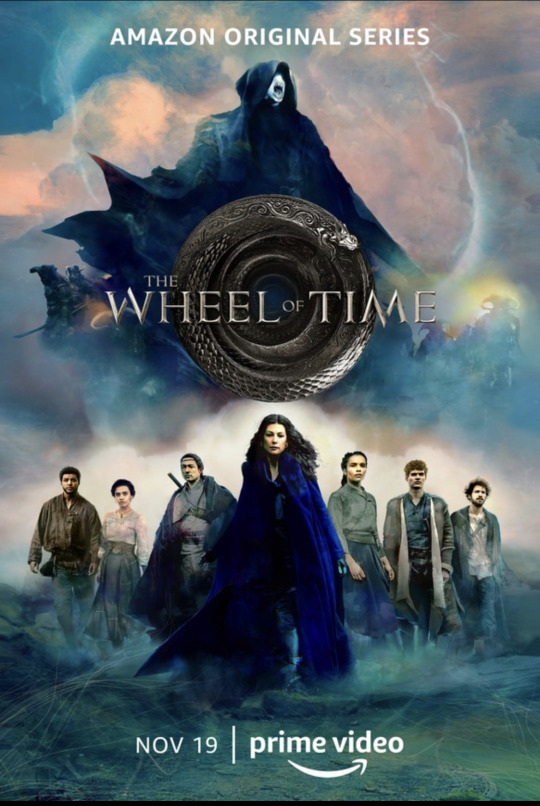
In high school I had to read “Ragtime” by E.L. Doctorow (and then write a comparison paper with another American novel—that I got an ‘A’ for somehow managing to find something to compare and contrast between this contemporary-style historial fiction book and the gothic ghost story “Turn of the Screw” should tell you that back in high school I was really good at writing a lot of BS).
The book itself was pretty good—really interesting, a mix of real historical figures and some archetypes (literally called ‘Mother,’ ‘Little Boy,’ etc) about the turn of the century, and racism, unions, immigration, women’s sufferage, and peaceful versus violent protests.
It also has…some really questionable moments (I’m looking you, Younger Brother, with your “ticket tape parade” ejeaculation while watching anarchist Emma Goldman give disgraced socialite Evelyn Nesbitt a sensual massage—that’s an image I’m never getting out of my brain, and now you all can share it with me).
There is a “Ragtime” movie, with the only good thing being Mandy Patinkin playing Tata. The movie really leaned into the sensational, silly parts of the book (there is a scene where Evelyn is topless for no reason other than they wanted an ‘R’ rating, I’m guessing?). They left out so many of the more interesting plolines, like Mother becoming independent.
And then they made a musical, and this was perfection. They took all the good parts of the novel, cut out the stupid bits that really didn’t add anything, changed a few things to keep the story going, and told essentially told the same story with amazing music, only better. They kept the focus on the theme “change is hard and can be scary,” without looking for sensationalizing moments. I really think theaters all over the US should have been playing it in 2016 because it is just so timely, and really hits on so many contemporary topics.
So, what does this have to do with the reason for this Tumblr account, The Wheel of Time? Book fans, I think, are generally in agreement that while the books are awesome, they can be problematic at times (so much spanking, a lot of male-gazy romance plotlines, domestic violence and male rape treated largely with humor, among some of the big things).
The show has a chance to change some of this (and they have already, by addressing the excessive puritanical virginity of many of the main characters [I can’t buy that Min was a virigin!], not having Nynaeve hit everyone with a stick, no one has even mentioned the word ‘breast’ so far, and so on), and update some of the problematic bits to make the story better (I have high hopes for Perrin/Faile to be less dysfunctional). Queer representation is much more explicit, and actors of color are killing it in roles that were viewed by white readers as white.
There are things I miss—Lan training the boys in weapon fighting, the Perrin/Egwene rescue from the Whitecloaks, Mat going to Fal Dara, the name a few. Some of those missing things are important, and I’m hoping later seasons will do them justice. But I think the key thing is to realize it could have been just awful, like the “Ragtime” movie. Anyone ever see “When the Dark Comes Rising”? That was such a disappointing adaptation. Or the recent “A Wrinkle in Time”? Ugh. I love the Harry Potter movies, but there are so many changes from the books, in some places feeling like a really different story.
Instead, we have amazing costumes, detailed sets, great actors, and so many delightful Easter eggs for the book fans that are bringing this epic to life. The team seems to really love the source and to respect it at every opportunity. For every change I don’t love, there are so many other things I adore. I think the fans are the winners here. (Except when it comes to merchandizing—how is Amazon not all over this??)
TL;DR: Book great, show a little different but also great, and I’m dying for Season 2.
#wheel of time#wot on prime#killing time until season 2#ragtime#ragtime the musical is amazing#the movie is trash#WoT fans are living the dream#my personal opinions
16 notes
·
View notes
Photo

The reading room of the New York Public Library, main branch (42nd St.) in the 1950s. Many authors have written books and articles here, including:
The Feminine Mystique by Betty Friedan
The Making of the President 1964 by Theodore H. White
On Native Grounds by Alfred Kazin
Other Shores by Diana Nyad
The Power Broker by Robert Caro
Ragtime by E.L. Doctorow
Zelda by Nancy Milford
Photo: Charles Phelps Cushing via ClassicStock/Getty Images/Fine Art America
#New York#NYC#vintage NY#1950s#NY Public Library#42nd St. Library#books#authors#Charles Phelps Cushing#writing
92 notes
·
View notes
Text
i bought four more books today. I don’t know where to put them.
#meanwhile i'm slogging through this marie antoinette book#which is sadly shallow#but i bought ragtime by e.l. doctorow today which i'm super excited about#also the alienist and the miraculous journey of edward tulane#and the ropemaker by peter dickinson
4 notes
·
View notes
Note
Happy STS, Claire!
Today's question is characters :)
Do you prefer writing with a small cast or a big one? Do you prefer single, dual or multi pov? Does it vary from project to project?
If you write multi pov, be honest: Do you have a favorite one?
Happy STW, Elli! Thanks for the ask!
I'm not very ambitious on this front, lol. I've never written more than 2 POVs in anything. And up until I started writing romances, I never really wrote more than ONE POV.
Oddly enough, though, many of my favorite historical epics have huge casts and multiple POVs: I'm thinking specifically of Ragtime (and others) by E.L. Doctorow, Dreamland by Kevin Baker, and probably several other books like them. I've just personally never attempted this and I'm not sure I ever would. Two just feels right and like enough for me.
The Adored has one POV character and 2 MCs, technically, but it really has 4 "major" characters. And that's about as big a main cast as I've ever attempted or really have any desire to attempt.
And of course, I'll drop dead before I'll be forced to choose between the POVs of my babies in GSNBTR. Nice try, though!
4 notes
·
View notes